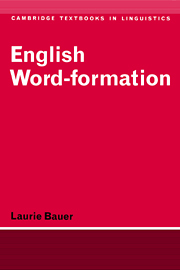Book contents
- Frontmatter
- Contents
- Dedication
- Preface
- 1 Introduction
- 2 Some basic concepts
- 3 Lexicalization
- 4 Productivity
- 5 Phonological issues in word-formation
- 6 Syntactic and semantic issues in word-formation
- 7 An outline of English word-formation
- 8 Theory and practice
- 9 Conclusion
- Bibliography and citation index
- Index
- Frontmatter
- Contents
- Dedication
- Preface
- 1 Introduction
- 2 Some basic concepts
- 3 Lexicalization
- 4 Productivity
- 5 Phonological issues in word-formation
- 6 Syntactic and semantic issues in word-formation
- 7 An outline of English word-formation
- 8 Theory and practice
- 9 Conclusion
- Bibliography and citation index
- Index
Summary
The time of the lexicon has set in.
(Hakulinen, 1978: 325)Assumptions and aims
The study of word-formation seems to be emerging from a fallow period. Suddenly word-formation is of central interest to theoretical linguists of all persuasions because of the light it throws on other aspects of language. Unfortunately, there is little agreement on the methodology or basic theoretical background for the study of word-formation, so that the field is currently a confused one.
There is, at the moment, no single “theory of word-formation”, nor even agreement on the kind of data that is relevant for the construction of such a theory. This book will not provide a theory, but it will provide an introduction to, and discussion of, some of the basic problems confronting students of word-formation, and draw some conclusions which, it seems to me, must be basic to any future theory. However, given the confusion that reigns at the moment, it should be borne in mind that virtually any theoretical statement about word-formation is controversial, and that this book provides a starting point for discussion more than a body of accepted theoretical dogma.
The basic approach to word-formation taken in this book is synchronic and transformational; but the synchrony is diluted by frequent consideration of diachronic facts, and the way in which the transformational background has been used is untraditional.
- Type
- Chapter
- Information
- English Word-Formation , pp. 1 - 6Publisher: Cambridge University PressPrint publication year: 1983

